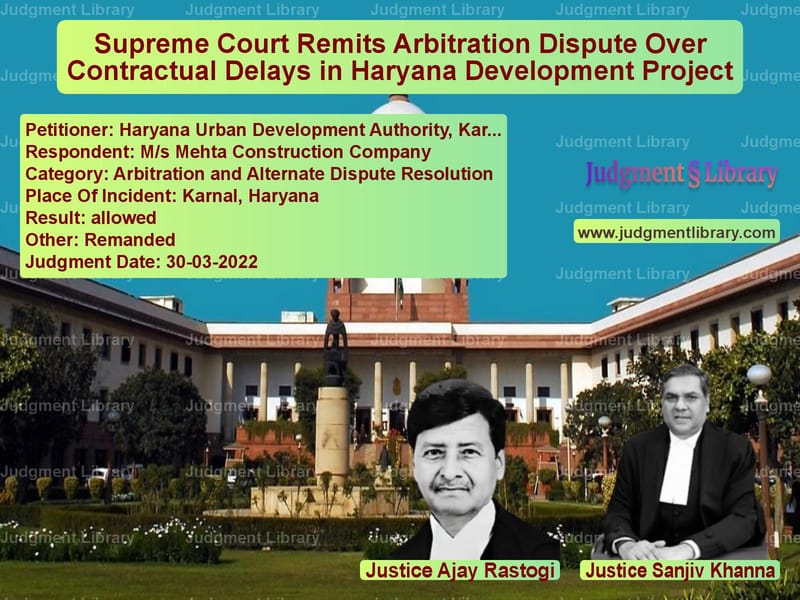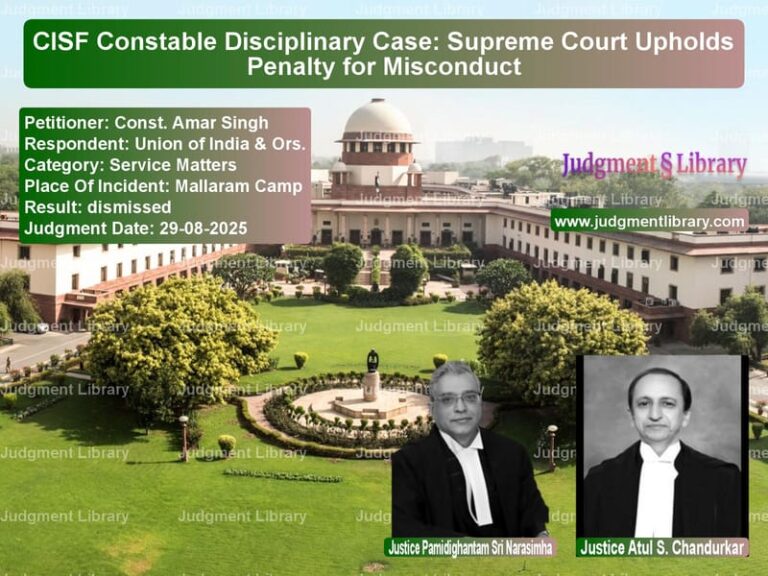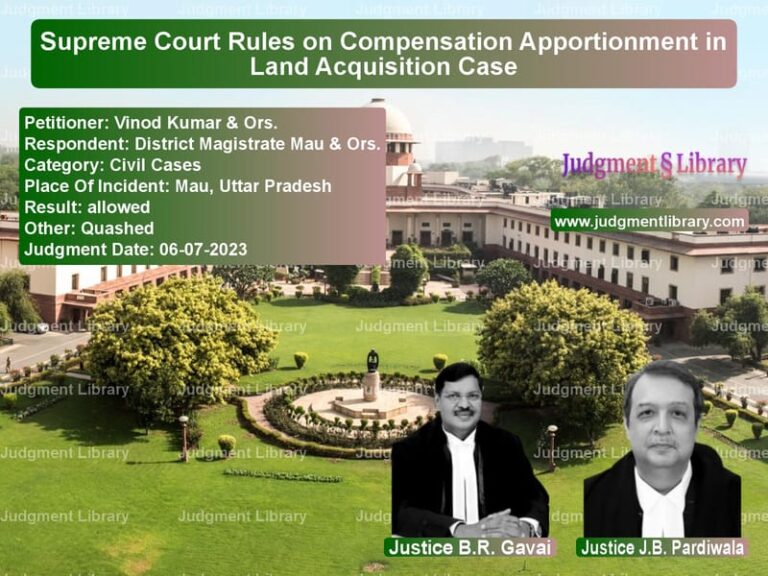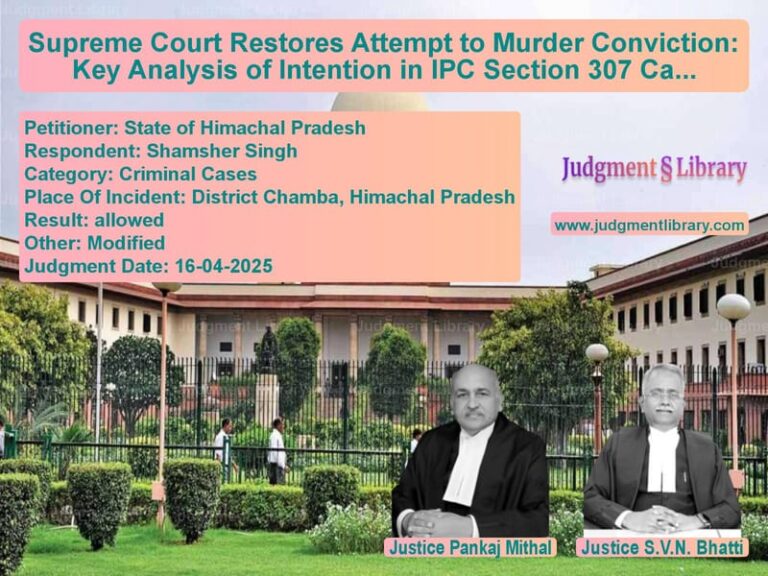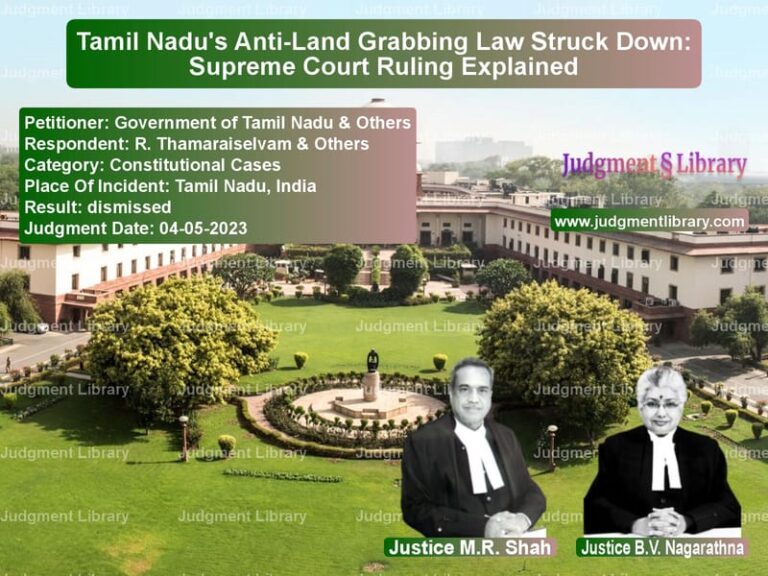Supreme Court Remits Arbitration Dispute Over Contractual Delays in Haryana Development Project
The case of Haryana Urban Development Authority, Karnal vs. M/s Mehta Construction Company revolves around an arbitration dispute concerning delays in a public infrastructure project. The Supreme Court’s judgment clarifies the scope of judicial interference in arbitration proceedings and highlights the importance of addressing limitation issues in arbitration objections.
This appeal was filed by the Haryana Urban Development Authority (HUDA), challenging the Punjab and Haryana High Court’s decision that upheld the rejection of HUDA’s objections to an arbitral award due to a delay in filing. The Supreme Court overturned the lower courts’ decisions and remitted the matter for reconsideration on merits.
Background of the Case
The dispute arose from a construction contract between HUDA and M/s Mehta Construction Company on July 6, 1998. The contract involved constructing a water body, pedestrian bridge, pump chamber, and other infrastructure for the development of a town park in Sector 8 and 9 (Phase II), Karnal. The initial contract amount was Rs. 32.50 lakhs, which was later revised to Rs. 45.87 lakhs.
The contractual work was completed on August 24, 1999, but a dispute arose over the delay in completion. While HUDA argued that the contractor failed to meet the contract timeline, the contractor claimed that HUDA was responsible for the delay.
Key Legal Issues
- Whether the objections filed by HUDA under Section 34 of the Arbitration and Conciliation Act, 1996 were time-barred.
- Whether the arbitral award suffered from legal infirmities that warranted judicial interference.
- Whether the lower courts erred in dismissing the objections without examining their merits.
Arguments Presented by the Petitioner (HUDA)
HUDA contended:
- The delay in filing objections under Section 34 was minimal and should have been condoned.
- The contractor had failed to complete the work within the contractual period, and the arbitrator had overlooked this aspect.
- The Additional District Judge and the High Court erred in rejecting the objections solely on limitation grounds without addressing the merits.
Arguments Presented by the Respondent (M/s Mehta Construction Company)
The respondent argued:
- The arbitral award was legally valid and was based on evidence proving that HUDA contributed to the delay.
- HUDA’s objections were time-barred as they were not filed within the prescribed three-month limitation period under Section 34(3) of the Arbitration Act.
- The Additional District Judge had correctly held that HUDA’s delay in filing objections was not justified.
Supreme Court’s Observations and Verdict
The Supreme Court examined the validity of HUDA’s objections and the extent of judicial intervention in arbitration awards. The Court made the following key observations:
- The delay in filing objections was within the condonable period of 30 days under the proviso to Section 34(3) of the Arbitration Act.
- The lower courts should have exercised discretion in condoning the delay, especially considering the importance of the dispute.
- The objections raised by HUDA required detailed examination, particularly regarding the issue of whether the award suffered from patent illegality.
- The High Court’s dismissal of the appeal without engaging with the merits of the case was unjustified.
Based on these findings, the Supreme Court ruled:
- The appeal was allowed.
- The orders of the Additional District Judge and the Punjab and Haryana High Court were set aside.
- The matter was remitted to the Additional District Judge, Karnal, for fresh consideration of HUDA’s objections on merits.
Legal Precedents Considered
The Supreme Court referred to multiple judgments on arbitration and limitation:
- State of Goa vs. Praveen Enterprises (2012): Clarified the limitation period for challenging arbitration awards.
- ONGC vs. Saw Pipes Ltd. (2003): Explained the concept of patent illegality as a ground for setting aside an arbitral award.
- Fiza Developers vs. AMCI (India) Pvt. Ltd. (2009): Stated that objections under Section 34 must be considered on merits unless grossly time-barred.
Impact of the Judgment
This ruling has significant implications for arbitration proceedings in India:
- It reaffirms that judicial intervention in arbitration must be exercised cautiously.
- It emphasizes that limitation periods in arbitration cases must be interpreted with fairness and discretion.
- It ensures that government bodies cannot evade arbitration outcomes solely based on procedural delays.
- It clarifies the applicability of Section 34(3) of the Arbitration Act and the grounds for condonation of delay.
By remitting the case for reconsideration, the Supreme Court has ensured that the objections raised by HUDA are fairly examined without being dismissed purely on technical grounds.
Petitioner Name: Haryana Urban Development Authority, Karnal.Respondent Name: M/s Mehta Construction Company.Judgment By: Justice Ajay Rastogi, Justice Sanjiv Khanna.Place Of Incident: Karnal, Haryana.Judgment Date: 30-03-2022.
Don’t miss out on the full details! Download the complete judgment in PDF format below and gain valuable insights instantly!
Download Judgment: haryana-urban-develo-vs-ms-mehta-constructi-supreme-court-of-india-judgment-dated-30-03-2022.pdf
Directly Download Judgment: Directly download this Judgment
See all petitions in Arbitration Awards
See all petitions in Contract Disputes
See all petitions in Judgment by Ajay Rastogi
See all petitions in Judgment by Sanjiv Khanna
See all petitions in allowed
See all petitions in Remanded
See all petitions in supreme court of India judgments March 2022
See all petitions in 2022 judgments
See all posts in Arbitration and Alternate Dispute Resolution Category
See all allowed petitions in Arbitration and Alternate Dispute Resolution Category
See all Dismissed petitions in Arbitration and Alternate Dispute Resolution Category
See all partially allowed petitions in Arbitration and Alternate Dispute Resolution Category

